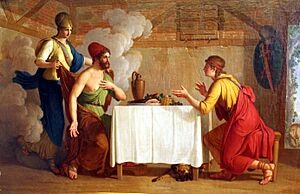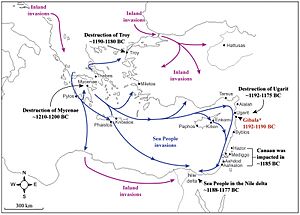Cretan Lie facts for kids
The Cretan Lie is a famous made-up story told by the hero Odysseus in the ancient Greek epic poem, the Odyssey. In this story, Odysseus pretends to be someone else and tells a long, untrue tale about his adventures. He shares this fake story with a loyal pig herder named Eumaeus. This particular lie has made experts wonder if it might be based on real events from a very long time ago.
What is the Cretan Lie?
In his made-up story, Odysseus claims he couldn't go back to his home island of Crete after the Trojan War. He says that the gods made him lead a group of ships to attack Egypt. But then, the powerful god Zeus got angry, and Odysseus's fleet was defeated.
However, the Egyptian king felt sorry for Odysseus. So, Odysseus stayed in Egypt for a while and gathered a lot of treasure. Later, he says he lost all his wealth when his ship sank in a terrible storm.
Here's a small part of what Odysseus said in his story:
- "But a spirit in me urged, 'Set sail for Egypt—
- fit out ships, take crews of seasoned heroes!'
- Nine I fitted out, the men joined up at once
- and then six days my shipmates feasted well"
And then, about his crew's actions:
- "But swept away by their own reckless fury, the crew went berserk—
- they promptly began to plunder the lush Egyptian farms,
- dragged off the women and children, killed the men.
- Outcries reached the city in no time—stirred by shouts"
This part of the story comes from Book XIV of the Odyssey, written by Homer.
Why is this Story Important?
Many historians and archaeologists study the Cretan Lie because it sounds a lot like real historical events. It reminds them of the Sea Peoples, who were groups of raiders that attacked ancient Egypt and other parts of the Eastern Mediterranean around 1200 BC.
For example, the story of Odysseus's fleet attacking Egypt is similar to the Battle of the Delta, where the Egyptians fought off the Sea Peoples. This battle is recorded on the walls of the mortuary temple of Ramses III at a place called Medinet Habu.
Also, the story says Odysseus lived in Egypt and became rich. This is similar to how the Egyptian pharaoh Ramesses II took some of the invading Sherden (a group of Sea Peoples) and made them part of his own royal guards.
Because of these similarities, some experts believe that Odysseus's made-up story might actually contain hints of real events from the Late Bronze Age collapse. This was a time when many powerful civilizations in the Mycenaean world and the Near East collapsed. The story might have been passed down through oral traditions, meaning people told it by word of mouth for many years before it was written down.
 | William L. Dawson |
 | W. E. B. Du Bois |
 | Harry Belafonte |



